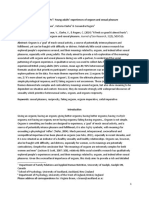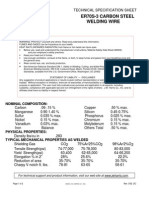0 ratings0% found this document useful (0 votes)
675 viewsTMS
TMS
Uploaded by
rizviabbas2012Traumatic Masturbatory Syndrome (TMS) is the habit of masturbating in a prone position by rubbing the penis against the mattress or floor. This practice puts excessive pressure on the penis and desensitizes it. As a result, over half of males with TMS suffer from sexual dysfunctions like delayed or absent orgasm with partners. The document provides questions and answers about defining and treating TMS by ceasing prone masturbation and retraining oneself to masturbate in the conventional supine position.
Copyright:
© All Rights Reserved
Available Formats
Download as PDF, TXT or read online from Scribd
TMS
TMS
Uploaded by
rizviabbas20120 ratings0% found this document useful (0 votes)
675 views2 pagesTraumatic Masturbatory Syndrome (TMS) is the habit of masturbating in a prone position by rubbing the penis against the mattress or floor. This practice puts excessive pressure on the penis and desensitizes it. As a result, over half of males with TMS suffer from sexual dysfunctions like delayed or absent orgasm with partners. The document provides questions and answers about defining and treating TMS by ceasing prone masturbation and retraining oneself to masturbate in the conventional supine position.
Original Description:
Raw
Copyright
© © All Rights Reserved
Available Formats
PDF, TXT or read online from Scribd
Share this document
Did you find this document useful?
Is this content inappropriate?
Traumatic Masturbatory Syndrome (TMS) is the habit of masturbating in a prone position by rubbing the penis against the mattress or floor. This practice puts excessive pressure on the penis and desensitizes it. As a result, over half of males with TMS suffer from sexual dysfunctions like delayed or absent orgasm with partners. The document provides questions and answers about defining and treating TMS by ceasing prone masturbation and retraining oneself to masturbate in the conventional supine position.
Copyright:
© All Rights Reserved
Available Formats
Download as PDF, TXT or read online from Scribd
Download as pdf or txt
0 ratings0% found this document useful (0 votes)
675 views2 pagesTMS
TMS
Uploaded by
rizviabbas2012Traumatic Masturbatory Syndrome (TMS) is the habit of masturbating in a prone position by rubbing the penis against the mattress or floor. This practice puts excessive pressure on the penis and desensitizes it. As a result, over half of males with TMS suffer from sexual dysfunctions like delayed or absent orgasm with partners. The document provides questions and answers about defining and treating TMS by ceasing prone masturbation and retraining oneself to masturbate in the conventional supine position.
Copyright:
© All Rights Reserved
Available Formats
Download as PDF, TXT or read online from Scribd
Download as pdf or txt
You are on page 1of 2
What is Traumatic Masturbatory Syndrome?
Traumatic Masturbatory Syndrome (TMS) is the
habit some males have of masturbating in a face-
down (prone) position. Some TMS practitioners
rub their penises against the mattress, pillow, or
other bedding, while others thrust into their
hand. Some rub against the floor.
What's wrong with masturbating this way?
Masturbating face-down puts excessive pressure
on the penis, and especially on the base of the
penis. These sensations are not easily replicated
in conventional masturbation or in sexual
intercourse. This can make TMS practitioners
unable to have normal sexual relations. Males
who masturbate conventionally have sex 6.6
times more often than TMS practitioners.
The most common problems TMS sufferers
have are inorgasmia (also called anorgasmia; it's
the inability to have an orgasm during
intercourse); or delayed orgasm. Many TMS
sufferers also have trouble getting erections. It's
a common experience among males who are
used to masturbating face-down to engage in
sexual intercourse for over half an hour, fail to
have an orgasm, and then try to reach orgasm in
an atypical (and usually unenjoyable) way, such
as thrusting the penis against his partner's legs,
palm, or bed. Needless to say, the female
partners of these men find their behavior unusual
and disturbing. These women often wonder if
they are to blame for the man's inability to reach
orgasm through intercourse. Nearly 60 percent
of males who masturbate prone suffer from
inorgasmia or delayed orgasm most of the time
they have sexual intercourse, while only 4
percent of males who masturbate supine do.
Nearly a third of males who masturbate prone
suffer from erectile dysfunction most of the time
they have sexual intercourse, while only 5
percent of males in the same age group who
masturbate supine do.
These things are understandable consequences
of prone masturbation. Even males who
masturbate the conventional way don't get as
much stimulation from intercourse as from
masturbation. (Because in masturbation one can
control precisely the type, force, and location of
the stimulation one gets, while in intercourse a
lot of that is not under control.) For TMS
practitioners, the amount of stimulation in
intercourse is a small fraction of what they get
masturbating.
______________________________________
Traumatic Masturbatory
Syndrome (TMS) is the habit of
masturbating prone. It causes
severe sexual dysfunction in most
males who practice it.
_______________________________________
How did these men develop TMS?
More than 90 percent of males learn to
masturbate through self-discovery. The males
who practice TMS unfortunately self-discovered
the wrong way. Males who learn to masturbate
from other people invariably learn to do it the
correct way. (Most males who discover it for
themselves also discover the conventional way.)
What's the conventional way?
Over 90 percent of males lie on their backs and
make a fist around their penises and stroke in an
up and down motion. Nearly all TMS
practitioners are aware that males usually
masturbate this way, but many think that their
way is merely a harmless variation, or even that
it's better than regular masturbation. All men
who masturbate face-down think the way they
masturbate is more similar to missionary-style
intercourse than conventional masturbation is.
Isn't it?
Only in the sense that sitting on a park bench is
more similar to piloting a boat from a chair than
piloting a boat while standing is. For some
reason, the amount of pressure the penis gets
(and the parts of it that get stimulated) in
intercourse are more similar to conventional
masturbation than to face-down masturbation. It
defies what every TMS practitioner regards as
common sense, but those who masturbate the
typical way have the fewest problems adjusting
to intercourse.
When was TMS defined as a problem?
TMS was first pathologized in a 1998 article in
the J ournal of Sex and Marital Therapy by Dr.
Lawrence I. Sank of the Center for Cognitive
Therapy in Bethesda, Maryland.
Is it always harmful to masturbate prone?
Yes. While much of the popular information
about masturbation on the Internet promotes
face-down masturbation as merely a harmless
variation, individuals who suffer from TMS
report that the effects of this behavior are
generally cumulative. So, although practicing
TMS on occasion may not produce any
immediately noticeable negative effects, this
behavior over time can result in a gradual or
sudden loss of sexual function. Since every time
you practice this behavior you are applying
unnatural pressure and stimulation to your
genitalia, it is never a good idea to engage in this
type of masturbation. The challenge for the TMS
sufferer is to learn to masturbate supine -- every
time -- and to restore sensitivity to the penis for
successful sex.
How prevalent are the problems TMS
sufferers have in bed?
Those who masturbate face down are five times
more likely than those who masturbate face up
to have erectile dysfunction and twelve times
more likely to have anorgasmia.
Most men with TMS, if they can have
intercourse at all, are usually limited to the
"missionary" position. They also report an
inability to achieve orgasm from fellatio. Of
course, manual stimulation by a partner does
them no good. The majority of males who
masturbate conventionally have had intercourse
successfully in at least five positions.
Does TMS cause physical damage in addition
to these psychological problems?
Possibly. The penis wasn't designed for such
brutal contact. But most males can become
normal by merely "unlearning" TMS behavior,
which suggests that the physical damage is
minor or even non-existent.
How does one unlearn prone masturbation?
One has to stop masturbating in prone fashion
and learn to do it the conventional way. This
might take a bit of time and practice. Many
TMS sufferers can masturbate the conventional
way if they haven't had an orgasm for an exten-
ded period of time, perhaps a week. By limiting
masturbation to only when they can do it
without resorting to their old (face-down) habits,
they can learn to masturbate conventionally.
According to Dr. Sank, most TMS sufferers
practice the habit daily. (Many normal males --
and most younger ones -- masturbate daily too.)
You can quit for days at a time. Your penis will
be more sensitive after a period of abstinence
and this will make it easier for you to learn to
masturbate manually.
I masturbate to help me sleep at night. This
makes me reluctant to quit even for a week.
Many males masturbate at bedtime. But one
must forego daily masturbation at least as long
as is necessary to habituate the penis to regular
masturbation. It might be necessary to use other
means of falling asleep in the meantime. A
prescription or non-prescription sleep aid might
be helpful.
When I'm cured, can I have intercourse
without problems?
You should be completely cured (i.e., able to
masturbate daily the conventional way) for at
least a month (and perhaps longer) before
attempting intercourse. There might also be a
learning curve as you get used to the somewhat
different feeling of post-TMS intercourse. Even
so, you should be much more successful at
making love than you were before you quit
TMS.
Why can't I just have intercourse after my
week of abstaining instead of masturbating?
no one has been cured of TMS by having
intercourse. The cure for TMS is learning to
masturbate the conventional way. You have to
masturbate the conventional way on a daily basis
for at least a month (maybe longer) before you
will have unlearned TMS. Having intercourse
sooner might not only be unsuccessful but also
threatens to undo the progress you've made in
getting cured of TMS.
Overall, being cured of your TMS will make you
more whole sexually. 03/05
For more information and links to a support
group for males getting cured of TMS:
http://www.healthystrokes.com
TRAUMATIC
MASTURBATORY
SYNDROME
Questions and answers
about the hazards of
prone masturbation
From the web site
HealthyStrokes.com
You might also like
- Tajfel, Henri (1979) - Individual and Groups in Social PsychologyDocument8 pagesTajfel, Henri (1979) - Individual and Groups in Social PsychologyArthur PoziomyckNo ratings yet
- HEXACO PI R English Self100Document5 pagesHEXACO PI R English Self100MilosNo ratings yet
- Are Wet Dreams Your ProblemDocument4 pagesAre Wet Dreams Your Problemmadhu262No ratings yet
- Performance AnxietyDocument30 pagesPerformance Anxietyhunghl9726No ratings yet
- Gay Men's Health Agenda 2009Document5 pagesGay Men's Health Agenda 2009Chris Bartlett100% (4)
- Sex and BreathlessnessDocument2 pagesSex and Breathlessnessbooter_bewareNo ratings yet
- Are You Fertile?: Guides on Healthy Lifestyles that Increases Fertility Chances in Men and WomenFrom EverandAre You Fertile?: Guides on Healthy Lifestyles that Increases Fertility Chances in Men and WomenNo ratings yet
- Medium 1Document4 pagesMedium 1Jozzy MarcyNo ratings yet
- Musical Forms and Genres: SparkCharts PDFDocument2 pagesMusical Forms and Genres: SparkCharts PDFElizabeth Alarcón-GaxiolaNo ratings yet
- Pornography's Depiction of WomenDocument8 pagesPornography's Depiction of WomenJackie RibackNo ratings yet
- Sex TraffickingDocument16 pagesSex Traffickingapi-537527821No ratings yet
- What Woman Want ?: Ryan MeokDocument3 pagesWhat Woman Want ?: Ryan MeokRyanMeokNo ratings yet
- Factsheet: Low Libido (Sexual Desire)Document1 pageFactsheet: Low Libido (Sexual Desire)vdphbfiuNo ratings yet
- Marina Ashade Q&ADocument1 pageMarina Ashade Q&AblairmloNo ratings yet
- Sexual Pharmacology in The 21st CenturyDocument9 pagesSexual Pharmacology in The 21st CenturyFawaaz KhurwolahNo ratings yet
- Masturbation AddictionDocument7 pagesMasturbation AddictionHussein MaherNo ratings yet
- My Partner Never Wants To Make Love. What'S Wrong?: Download Our Free Mega Herbal Ebook Here!Document6 pagesMy Partner Never Wants To Make Love. What'S Wrong?: Download Our Free Mega Herbal Ebook Here!feowfeowNo ratings yet
- Portrait of An ExhibitionistDocument15 pagesPortrait of An Exhibitionist116 - Kencana NoorNo ratings yet
- Why Women Have Sex Understanding Sexual Motivati Zjhdcfl8Document2 pagesWhy Women Have Sex Understanding Sexual Motivati Zjhdcfl8Marian GanciuNo ratings yet
- Transgender Women - Evaluation and Management - UpToDateDocument29 pagesTransgender Women - Evaluation and Management - UpToDateRicardo Alessandro Teixeira Gonsaga0% (1)
- Flash Memoir FinalDocument3 pagesFlash Memoir Finalapi-539509165No ratings yet
- Sexually Transmitted DiseasesDocument6 pagesSexually Transmitted DiseasesIsis HernandezNo ratings yet
- Male Dyspareunia - UpToDate PDFDocument15 pagesMale Dyspareunia - UpToDate PDFCamilo HernandezNo ratings yet
- 13 Crucial Facts About Your PeniDocument3 pages13 Crucial Facts About Your PeniBelal AhmadNo ratings yet
- How Your Brain Falls in LoveDocument6 pagesHow Your Brain Falls in LovejkumarNo ratings yet
- Sexual Differenciation of The Human Brain in Relation To Gender IdentityDocument22 pagesSexual Differenciation of The Human Brain in Relation To Gender IdentityjcchapiNo ratings yet
- HC-792 GirlsandSex TG 3Document5 pagesHC-792 GirlsandSex TG 3Malix NhlapoNo ratings yet
- 11 Foods For Amazing Sex M16Document34 pages11 Foods For Amazing Sex M16fisieresalvateNo ratings yet
- Review: Incontinence: A Systematic Review. J Sex Med 2013 10:1682-1691Document10 pagesReview: Incontinence: A Systematic Review. J Sex Med 2013 10:1682-1691Anthony GarciaNo ratings yet
- Female Orgasmic DisorderDocument5 pagesFemale Orgasmic DisorderYamini JohriNo ratings yet
- Bisexualguide March2016 FinalDocument24 pagesBisexualguide March2016 Finalapi-342320816No ratings yet
- The 5 Hidden: Libido KillersDocument6 pagesThe 5 Hidden: Libido KillersscribduserNo ratings yet
- Costa MasturbationDocument2 pagesCosta MasturbationThomas HagnerNo ratings yet
- The Gender Spectrum - A Scientist Explains Why Gender Isn't BinaryDocument16 pagesThe Gender Spectrum - A Scientist Explains Why Gender Isn't BinaryTokiyo LanfrancoNo ratings yet
- An Orgasm Is Who Defines What An Orgasm Is?: Sexual and Relationship TherapyDocument8 pagesAn Orgasm Is Who Defines What An Orgasm Is?: Sexual and Relationship Therapytharuka1000No ratings yet
- Sexuality Among Older Adults-Holmes sp20Document11 pagesSexuality Among Older Adults-Holmes sp20api-437977619100% (1)
- Premature EjaculationDocument21 pagesPremature EjaculationdnpsptsNo ratings yet
- Male Multiple Orgasm SurveyDocument3 pagesMale Multiple Orgasm SurveygmeadesNo ratings yet
- How Porn Really Affects Your Sex Life Mens HealthDocument7 pagesHow Porn Really Affects Your Sex Life Mens Healthsharkz fujiwaraNo ratings yet
- Sexual Script QuestionnaireDocument2 pagesSexual Script QuestionnaireDubravka Pešorda100% (1)
- McCoy - Reasons For Pretending Orgasm InventoryDocument11 pagesMcCoy - Reasons For Pretending Orgasm InventoryCsanyi EditNo ratings yet
- Knowing WomenDocument332 pagesKnowing WomenAbbas AlkhudairyNo ratings yet
- Disorder of Male Sexual FunctionDocument60 pagesDisorder of Male Sexual Functiongireeshsachin100% (1)
- Romantic Myths & Ending Codependent RelationshipsDocument7 pagesRomantic Myths & Ending Codependent RelationshipsLynn WolfNo ratings yet
- Opperman Braun Clarke Rogers Orgasm JSRDocument23 pagesOpperman Braun Clarke Rogers Orgasm JSRZipidinili MalanadalaNo ratings yet
- Screenshot 2024-08-12 at 1.50.18 AMDocument1 pageScreenshot 2024-08-12 at 1.50.18 AMShayla LopezNo ratings yet
- Sexual ProblemsDocument7 pagesSexual Problemselan sudjanamihardjaNo ratings yet
- Compulsive Sexual Behavior in Young AdultsDocument8 pagesCompulsive Sexual Behavior in Young AdultsFestijo , Kenneth100% (1)
- Women's Preferences For Penis Size: A New Research Method Using Selection Among 3D ModelsDocument17 pagesWomen's Preferences For Penis Size: A New Research Method Using Selection Among 3D ModelsGustavo FigueroaNo ratings yet
- Pornography EffectsDocument3 pagesPornography EffectsIrina BulgaruNo ratings yet
- Orgasm and Ejaculation PDFDocument10 pagesOrgasm and Ejaculation PDFadityaNo ratings yet
- Treatment of Premature EjaculationDocument6 pagesTreatment of Premature Ejaculationfirenzy jamesNo ratings yet
- Anti AndrogenDocument3 pagesAnti AndrogenRemya ChandranNo ratings yet
- Abnormal Sex BehaviorsDocument4 pagesAbnormal Sex BehaviorsannthemsNo ratings yet
- Appendix H Incel Terms and DescriptionsDocument2 pagesAppendix H Incel Terms and DescriptionsDemonica UnderworldNo ratings yet
- Increasing Circulating Testosterone Impact of Herbal Dietary Supplements.2329 9029.1000130Document9 pagesIncreasing Circulating Testosterone Impact of Herbal Dietary Supplements.2329 9029.1000130Golden Era BookwormNo ratings yet
- The Art of Lasting Long in Bed: Banish Premature EjaculationFrom EverandThe Art of Lasting Long in Bed: Banish Premature EjaculationNo ratings yet
- Every Man's Survival Guide to Ballroom Dancing: Ace Your Wedding Dance and Keep Cool on a Cruise, at a Formal, and in Dance ClassesFrom EverandEvery Man's Survival Guide to Ballroom Dancing: Ace Your Wedding Dance and Keep Cool on a Cruise, at a Formal, and in Dance ClassesNo ratings yet
- Ismaili FitnaDocument20 pagesIsmaili Fitnarizviabbas2012No ratings yet
- Schedule of Bank Charges (Exclusive of FED) Effective From January 01, 2012 International Banking NoDocument26 pagesSchedule of Bank Charges (Exclusive of FED) Effective From January 01, 2012 International Banking Norizviabbas2012No ratings yet
- Takhleeq-E-Pakistan Urdu History Islamic BookDocument79 pagesTakhleeq-E-Pakistan Urdu History Islamic BookMalik UmarNo ratings yet
- FINEPIX JV250 Series FINEPIX JV200 Series: Owner's ManualDocument112 pagesFINEPIX JV250 Series FINEPIX JV200 Series: Owner's Manualrizviabbas2012No ratings yet
- Benefits of ISO 9000Document9 pagesBenefits of ISO 9000rizviabbas2012No ratings yet
- Stick ElectrodeDocument1 pageStick Electroderizviabbas2012No ratings yet
- Entries PDFDocument313 pagesEntries PDFDemid OdkhuuNo ratings yet
- Schedule of Bank Charges (Exclusive of FED) Effective From January 01, 2012 International Banking NoDocument26 pagesSchedule of Bank Charges (Exclusive of FED) Effective From January 01, 2012 International Banking Norizviabbas2012No ratings yet
- Change of Bank NameDocument1 pageChange of Bank Namerizviabbas2012No ratings yet
- Sale Agreement 0Document12 pagesSale Agreement 0rizviabbas2012No ratings yet
- Features and SpecificationsDocument1 pageFeatures and Specificationsrizviabbas2012No ratings yet
- Astm F 856 - 88Document6 pagesAstm F 856 - 88rizviabbas2012No ratings yet
- Internal Vs External Combustion EnginesDocument5 pagesInternal Vs External Combustion Enginesrizviabbas2012No ratings yet
- Pford 2Document6 pagesPford 2rizviabbas2012No ratings yet
- Er70S-6 Carbon Steel Welding Wire: Technical Specification SheetDocument2 pagesEr70S-6 Carbon Steel Welding Wire: Technical Specification Sheetrizviabbas2012No ratings yet
- Er70S-3 Carbon Steel Welding Wire: Technical Specification SheetDocument2 pagesEr70S-3 Carbon Steel Welding Wire: Technical Specification Sheetrizviabbas2012No ratings yet
- American National Standards Institute 25 West 43rd Street, Fourth Floor New York, NY 10036 AnsiDocument11 pagesAmerican National Standards Institute 25 West 43rd Street, Fourth Floor New York, NY 10036 Ansirizviabbas2012No ratings yet
- Er70S-2 Carbon Steel Welding Wire: Technical Specification SheetDocument2 pagesEr70S-2 Carbon Steel Welding Wire: Technical Specification Sheetrizviabbas2012No ratings yet
- PlumbingCodeAmendments WebDocument18 pagesPlumbingCodeAmendments Webrizviabbas2012No ratings yet
- Plastic Pipe Selection GuideDocument6 pagesPlastic Pipe Selection Guiderizviabbas2012No ratings yet
- Arsenic, Drinking-Water and Health Risks Substitution in Arsenic Mitigation: A Discussion PaperDocument60 pagesArsenic, Drinking-Water and Health Risks Substitution in Arsenic Mitigation: A Discussion Paperrizviabbas2012No ratings yet
- Pford 2Document6 pagesPford 2rizviabbas2012No ratings yet
- SynopsisDocument4 pagesSynopsisaxnoorNo ratings yet
- 363-Article Text-1724-1-10-20201202Document11 pages363-Article Text-1724-1-10-20201202Febrianelly AmandaNo ratings yet
- ALCOHOLIMSDocument9 pagesALCOHOLIMSSantiago RamirezNo ratings yet
- ABDC Journal PDFDocument29 pagesABDC Journal PDFTahany El BannaNo ratings yet
- 13 Things Mentally Strong People Don't DoDocument2 pages13 Things Mentally Strong People Don't Doropes100% (7)
- Topic 3 - Values and The Helping RelationshipDocument23 pagesTopic 3 - Values and The Helping Relationshipdin7687No ratings yet
- AssertivenessworkbookDocument26 pagesAssertivenessworkbookruchikaNo ratings yet
- Oppositional Defiant DisorderDocument3 pagesOppositional Defiant Disorderalteahmae31No ratings yet
- Rhetorical Analysis AssignmentDocument6 pagesRhetorical Analysis Assignmentapi-385792402No ratings yet
- Self-Esteem Therapy: 24 Activities and Techniques For Your PracticeDocument16 pagesSelf-Esteem Therapy: 24 Activities and Techniques For Your PracticeNadeem IqbalNo ratings yet
- Resolving Obsessive Compulsive Disorder OCD Once and For AllDocument2 pagesResolving Obsessive Compulsive Disorder OCD Once and For AllAngelica CiubalNo ratings yet
- Psycho Social Risks: Psychosocial Risks and Workers HealthDocument2 pagesPsycho Social Risks: Psychosocial Risks and Workers HealthJuLieth Parra PeRezNo ratings yet
- WK 8 Conflict - Management - Skills LaptopDocument24 pagesWK 8 Conflict - Management - Skills LaptopAMEERA SHAFIQA MOHD RASHIDNo ratings yet
- Chapter Five KH 0Document22 pagesChapter Five KH 0martin arang jrNo ratings yet
- 7 Humanistic - Rogers - MaslowDocument29 pages7 Humanistic - Rogers - MaslowMae EscanillanNo ratings yet
- DLL Diss PsychoanalysisDocument6 pagesDLL Diss PsychoanalysismaxieclrncNo ratings yet
- Priyanka Pandey I JP P June 2017Document7 pagesPriyanka Pandey I JP P June 2017nicatanekuNo ratings yet
- Harry Sohal Assignment 1 Inclusive EdDocument8 pagesHarry Sohal Assignment 1 Inclusive Edapi-355551741No ratings yet
- Long Hours, Hundred of Emails and No Sleep: Does This Sound Satisfying JobDocument6 pagesLong Hours, Hundred of Emails and No Sleep: Does This Sound Satisfying Jobhelal uddinNo ratings yet
- Activity 01-CWTSDocument2 pagesActivity 01-CWTSCrisschelle OccianoNo ratings yet
- Swot AnalysisDocument10 pagesSwot AnalysisCasandra CalacatNo ratings yet
- Obsessive AssignmentDocument7 pagesObsessive AssignmentDolly GuptaNo ratings yet
- ManufacturingDocument6 pagesManufacturingWanjari UmeshNo ratings yet
- Well-Being, Organizational Environment and Culture in North-Eastern Electric Power Corporation LTDDocument10 pagesWell-Being, Organizational Environment and Culture in North-Eastern Electric Power Corporation LTDarcherselevatorsNo ratings yet
- Greg Holzheimer's ResumeDocument1 pageGreg Holzheimer's ResumeGreg HolzheimerNo ratings yet
- The Bystander Effect and The Evil of InactionDocument2 pagesThe Bystander Effect and The Evil of InactiontemplarknightxNo ratings yet
- Employee Satisfaction Survey Questionnaire: Your CompanyDocument3 pagesEmployee Satisfaction Survey Questionnaire: Your CompanyhasanpdmNo ratings yet
- Chapter 23 Disruptive Beahvior DisordersDocument5 pagesChapter 23 Disruptive Beahvior DisordersCatia Fernandes100% (1)













































































































